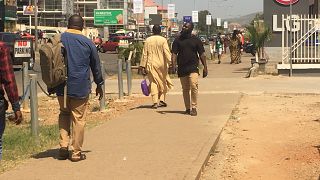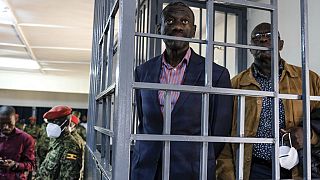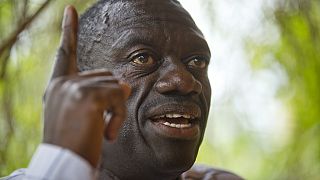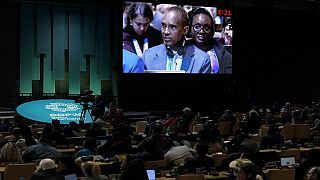Kenya
Joyce Mugure is one of many people who believe their lives have been turned around by access to good medical treatment.
Magure is at the Psychiatric Disability Organization in Nakuru, Kenya for a consultation with psychologist Martha Nyoro.
Magure struggled for many years with bipolar disorder, but she did not get a diagnosis or treatment until 2019.
According to the World Health Organization (WHO) effective treatment coverage in many countries is extremely low.
It says its annual awareness campaign World Mental Health Day has improved awareness in some countries, but many people with such conditions experience discrimination, stigma and even human rights violations.
Earlier this year a large study by Harvard Medical School concluded one out of every two people would experience a mental health disorder during their lifetime.
It involved face to face interviews with 150,000 people in 29 countries.
There’s increasing concern about young people especially, the WHO says suicide is the leading cause of death among 15-29 year olds.
The Psychiatric Disability Organization (PDO) estimates around 2 million people are living with health issues.
The PDO says since it was established in 2016 it has treated 20,000 people.
The PDO provides medication at a subsidised rate and it’s completely free for people who can’t afford it.
They also offer therapy sessions at Ksh,500 per session ($3.36 USD) and Ksh,500 ($3.36 USD) for the psychiatric assessment.
There is a service for people who can’t afford the payments.
“So many causes are leading to many people experiencing these mental health conditions. But we can also speak of the lack of awareness in the mental health area where we can say not so many people know that they are being affected in their mental health," says Nyoro.
Mugure fell into this category.
She says she had reached rock bottom before she found out how to seek help.
"I didn't know what I was going through, so all my life I have been feeling different, I have faced a lot of stigma and discrimination because most people around me didn’t understand what I was going through, nobody knew that it was an illness until one day when I was very suicidal, I saw someone advocating for mental health online and I reached out to them and they directed me to PDO Kenya.”
Now Mugure says she is able to lead a normal, productive life.
“I got my first psychiatric session and I was diagnosed with bi-polar disorder and started treatment. Since then I have been taking my medicine and therapy sessions at the organization and currently I am living productively I am able to go to work and even advocate for mental health," she says.
Nancy Obegi tells a similar story.
The grocery shop assistant and mother was unaware of her illness until she was taken to the PDO.
She now has two consultations each month.
"People used to discriminate (against) me. They thought that I am not okay, that I had gone mad but PDO has always been there for me. They have given me counselling, they have given me medicine until now I feel I am okay. I can stand on my own (meaning she is self-reliant) and I can do my own work by myself," says Obegi.
Gladys Mwiti is a psychologist and CEO of Oasis Kenya.
The organisation trains therapists as well as offering counselling and treatment.
Mwiti shares her recipe for good mental health.











01:37
Record participation at 24th Sofi Great Ethiopian Run
01:36
Kizza Besigye faces Military Court as Uganda-Kenya jurisdiction row deepens
02:34
Initiative in Nairobi's Mukuru slums uses fly lavae to tackle food waste
01:48
Kung Fu gains popularity among young people in Kenya
01:38
Drones beat logistical challenges to delivery of medical supplies in Kenya
01:43
Democrats in Kenya fear what the next four years will hold, after Trump's U.S. election win